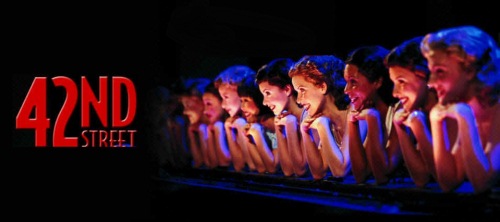Pas de biographie disponible.
Compositeur Musique additionelle Librettiste Parolier Metteur en scène Chorégraphe Producteur création Producteur version

Musical
Musique: Jerry Herman • Paroles: Jerry Herman • Livret: Mark Bramble • Michael Stewart • Production originale: 2 versions mentionnées
Dispo: Résumé
Genèse:
Résumé: Based on S. N. Behrman's play Jacobowsky and the Colonel, the story concerns an unlikely pair. S.L. Jacobowsky, a Polish-Jewish intellectual, has purchased a car he cannot drive. Stjerbinsky, an aristocratic, anti-Semitic colonel, knows how to drive but has no car. When the two men meet at a Paris hotel, they agree to join forces in order to escape the approaching Nazis. Together with the Colonel’s girlfriend, Marianne, they experience many adventures while on the road, but trouble ensues when Jacobowsky falls in love with the young girl.
Création: 27/12/1978 - Palace Theatre (Broadway) - représ.

Musical
Musique: Cy Coleman • Paroles: Michael Stewart • Livret: Mark Bramble • Production originale: 9 versions mentionnées
1
Dispo: Résumé Synopsis Génèse Liste chansons
Genèse: Original Broadway Production) The original production opened at the St. James Theatre on Broadway, on April 30, 1980 and closed on May 16, 1982 after 854 performances and 26 previews. It was directed and choreographed by Joe Layton, with scenic design by David Mitchell, costume design by Theoni V. Aldredge, and lighting design by Craig Miller. The musical starred Jim Dale as P.T. Barnum, Glenn Close as Charity Barnum, Marianne Tatum as Jenny Lind, Terri White as Joice Heth, and Terrence Mann as Chester Lyman. Original London Production The show made its West End debut on June 11, 1981 at the London Palladium, where it ran for 655 performances. The London cast included Michael Crawford as P.T. Barnum, Deborah Grant as Charity Barnum and Sarah Payne as Jenny Lind. Crawford reprised his role opposite Eileen Battye in a UK Tour of the show which ran between 1984 and 1986, stopping off at various venues including the Manchester Opera House and Victoria Palace Theatre. The tour was recorded for television and broadcast by the BBC in 1986. It was later released on VHS and DVD. Other productions International productions were staged in Australia (1982) starring Reg Livermore, Madrid (1984) starring Emilio Aragón, Florida (2008) starring Brad Oscar. In 2008, Cameron Mackintosh had reportedly voiced interest in producing a London or Broadway revival of Barnum starring either John Barrowman or Neil Patrick Harris.
Résumé: Barnum raconte l'histoire du Prince of Humbug, Phineas Taylor Barnum. Malgré les objections de sa femme, Charity, Barnum essaie de créer un spectacle dans lequel les attractions principales sont monstres de société. On y retrouve la plus vieille femme en vie, Joice Heth, le plus petit homme du monde, Tom Thumb, et encore mieux, un chanteur d'opéra suédois glamour, Jenny Lind. Finalement, Barnum consent à abandonner le spectacle et commencer une vie normale pour apaiser Charity. A la fin, après que la mort de Charity, Barnum revient dans le monde du cirque, très à la mode, en formant une association avec James A. Baily. Alors, les deux hommes créent 'The Greatest Show on Earth'.
Création: 30/4/1980 - St. James Theatre (Broadway) - représ.

Musical
Musique: Harry Warren • Paroles: Al Dubin • Livret: Mark Bramble • Michael Stewart • Production originale: 14 versions mentionnées
Dispo: Résumé Synopsis Commentaire Génèse Isnpiration Liste chansons
42nd Street, une comédie musicale écrite en 1980, est une célébration des claquettes des comédies musicales des années 1920 et 1930
Genèse: Producer David Merrick "took a huge gamble with his $3 million production based on the 1933 Warner Brothers film musical", as "only one other show had made the transfer from original movie musical to the stage -- 'Gigi,' a flop in 1974."[1][2] He felt audiences once again were ready to embrace the nostalgia craze started by the successful revivals of No, No, Nanette, Irene, and his own Very Good Eddie several years earlier, and augmented the familiar songs from the film's soundtrack with a liberal dose of popular tunes from the Dubin-Warren catalogue. According to theatre historian John Kenrick, "When the curtain slowly rose to reveal forty pairs of tap-dancing feet, the star-studded opening night audience at the Winter Garden cheered…Champion (who had no tap training) followed this number with a series of tap-infused extravaganzas larger and more polished than anything Broadway really had in the 1930s." Original Broadway) In June 1980, the musical premiered in out-of-town tryouts at the Kennedy Center for the Performing Arts in Washington, D.C. After six previews, the Broadway production opened on August 25, 1980 at the Winter Garden Theatre, eventually moving to the Majestic and then the St. James, closing after 3,486 performances. (Frank Rich called this a sign of the "shift of power" on Broadway, as the show had to leave the Winter Garden to make way for Cats and the Majestic to accommodate The Phantom of the Opera.) The original cast included Jerry Orbach as Julian Marsh, Tammy Grimes as Dorothy Brock, Wanda Richert as Peggy Sawyer, and Lee Roy Reams as Billy Lawlor. Replacements later in the run included Barry Nelson and Don Chastain as Julian, Elizabeth Allen, Dolores Gray, and Millicent Martin as Dorothy, and Lisa Brown and Karen Ziemba as Peggy. The show's designers, Robin Wagner (sets), Theoni V. Aldredge (costumes), and Tharon Musser (lights) were the same team who had designed the original Broadway production of A Chorus Line. The musical is the 12th longest runnning show in Broadway history, as of December 2010. This Tony Nominated wardrobe, designed by Theoni V. Aldredge, is on display at the Costume World Broadway Collection in Pompano Beach, Florida. However, the opening night triumph was overshadowed by tragedy. Following a 5 minute standing ovation, Merrick went onstage and stated, "It is tragic…Gower Champion has died." He went on to explain that Champion had died of cancer just hours before the performance, "when he said that Mr. Champion had died, there were gasps and screams." The producer had advised only Bramble of Champion's death and managed to keep the news a secret from the cast (including Richert, the director's girlfriend), crew, and the public prior to his announcement. 42nd Street proved to be not only Champion's last show but Merrick's final success. Merrick lived until 2000, but, as described by Anthony Bianco, 42nd Street "was his last big hit, his swan song." West End - 1984 The West End production opened at the Theatre Royal Drury Lane on August 8, 1984. The career of teenaged Catherine Zeta-Jones, a chorus member in the 1984 West End production, was launched when a vacation and an illness felled both the actress portraying Peggy Sawyer and her understudy on a night one of the producers happened to be in the audience. Zeta-Jones filled in and was impressive enough to be cast permanently in the role shortly afterward. Broadway revival - 2001 Bramble revised the book for and directed the Broadway revival, with choreography by Randy Skinner (dance assistant for the original production). It opened, after 31 previews, on May 2, 2001 at the Foxwoods Theatre (formerly the Ford Center for the Performing Arts), where it ran for 1,524 performances. The cast included Michael Cumpsty as Julian, Christine Ebersole as Dorothy, Kate Levering as Peggy, and David Elder as Billy. Meredith Patterson, who made her Broadway musical debut in the chorus and was the understudy for the role of Peggy Sawyer, took over the role in August 2001. Todd Lattimore, who was a swing and understudy took over the role of Billy. Other notable replacements included Patrick Cassidy and Tom Wopat as Julian and Shirley Jones and Beth Leavel as Dorothy. UK Tour - 2007 The Broadway revival production, by UK Productions, toured the UK in 2007. The cast included Paul Nicholas as Julian for the first part of the tour, later replaced by Dave Willetts, Julia J Nagle as Dorothy, Jessica Punch as Peggy and Ashley Nottingham as Billy.
Résumé: "42nd Street" est l'histoire d'une jeune actrice humble et naïve prénommée Peggy Sawyer qui est venue pour auditionner pour une nouvelle comédie musicale de Broadway. Malheureusement, à cause de sa nervosité, Peggy arrive en retard à l'audition et manque sa chance de joindre le chœur. Heureusement, Peggy a été remarquée par le célèbre metteur en scène, Marais Julien, et il donne à Peggy sa chance. Cependant, l'actrice principale vieillissante, Dorothy Brock, déteste rapidement Peggy. Le soir de l'opening night, Mlle. Brock tombe et se casse la cheville. La panique prend toute la compagnie, car le spectacle est vraisemblablement condamné à la fermeture, jusqu'à ce que l'on suggère que Peggy reprenne le rôle. En seulement trente-six heures, Peggy apprend vingt-cinq pages, six chansons et dix numéros de danse et devient une star.
Création: /7/1980 - Kennedy Center for the Performing Arts (Washington) - 3486 représ.

.png)
.png)




